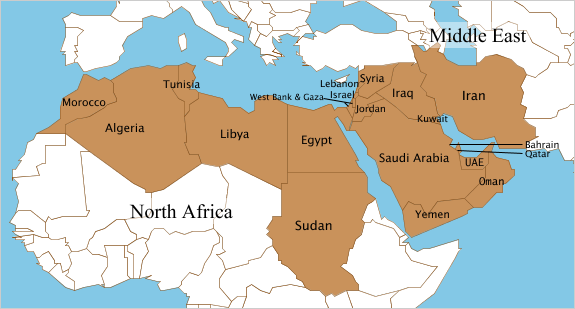
5 MENA News Stories You May Have Missed Over the Holidays
- Habib Essid Nominated as Tunisia’s Prime Minister
On Jan. 5, former Interior Minister Habib Essid was nominated as Prime Minister by Tunisia’s newly elected parliament. Essid is no stranger in the Congressional palace, as he held a variety of positions in autocrat Zine al-Abidine Ben Ali’s government before being appointed Minister of the Interior after the 2011 revolution The Guardian.
Mohamed Naceur, speaker of Congress, spoke in support of Essid’s nomination, stating, “We have chosen Essid because he is independent and has experience in the areas of security and the economy.”
Prime Minister Elect Essid is one of a number of pre-revolution government officials set to return following the most recent elections, including Beji Caid Essebi as President. Essebi, the founder of the now majority secular Nidaa Tounes party, is a long-known figure in Tunisian politics, serving as Minister of Foreign Affairs, ambassador to Germany, President of the Chamber of Deputies, and Interim Prime Minister in 2011.
- Middle East Peace Process Issues
Recent weeks have seen a number of moves from the Israeli Government and Palestinian Authority.
On December 31, Palestinian Authority President Mahmoud Abbas signed the Rome Statue– the founding document of the International Criminal Court.
In response to Abbas’ filing, Israeli Prime Minister Benjamin Netanyahu has halted the transfer of $127 million USD in tax revenue collected on behalf of the Palestinian Authority. Israel collects taxes on behalf of the PA and transfers on average about $100m USD per month, which accounts for approximately two-thirds of the PA’s budget.
The Israeli government is also poised to ask the US Congress to enforce a portion of the recent budget law that stipulates the US will cease providing almost $400m USD in aid to Palestinians annually should the Palestinian Authority take steps against Israel in the ICC.
Following the early December dissolution of the Israeli Knesset, Netanyahu is currently seeking a fourth term as Israeli Prime Minister with elections scheduled for March 17, 2015, further complicating a delicate situation.
- Increase in Restrictions on Syrian’s Entering Lebanon
A new regulation will now require Syrian’s entering Lebanon for reasons other than tourism and employment to fulfill certain criteria to obtain a visa and be granted legal access to the country.
Lebanon currently hosts more than one million Syrian refugees, displaced largely by the civil war between rebel forces and President Bashar al-Assad.
Up until this restriction, Syrian’s could stay in Lebanon for up to six months automatically. Lebanon shares a boarder with Syria is one of the countries most affected by the large number of refugees. There are currently more and 1.1 million registered refugees in Lebanon, though the government says the actual count is closer to 1.6 million.
The influx of refugees has created economic hardship for some, as rents throughout Lebanon are rising while wages are falling and many Lebanese say they are unable to find work BBC. Resentment towards refugees continues to grow, evidenced by the destruction of a new refugee camp built by an international charity by an angry mob.
The increase in refugees is also widening sectarian and religious divisions in Shia and Christian areas, as most refugees are Sunni. The result is an underlying fear that the continued and increasing refugee population could eventually trigger a renewed civil war in Lebanon.
- ISIL’s Pursuit of Legitimacy
In an attempt to gain legitimacy as a state, Al Jazeera reports ISIL has opened its first bank in the Iraqi city of Mosul and submitted a $2bn USD governing budget with a $250m USD surplus. The budget is said to include salaries for fighters and civil service like construction, waste management, and education, in Iraqi and Syrian territories surplus.
While it is unclear who is advising ISIL, the existence of an advisory board, called a Shura Council, involved in all decisions is well known. If the reports of a formalized bank are true, coupled with the regular use of propaganda ISIL’s desire for legitimacy and recognition, and the group’s actionable steps towards those goals, is clear.
- King Abdullah of Saudi Arabia Hospitalized with Pneumonia
King Abdullah, 90, was hospitalized with pneumonia on December 31st. State-run Saudi Press Agency stated Crown Prince Salman Bin Abdulaziz Al Saud,79, spoke to the cabinet and addressed the government at a weekly meeting on Monday, reassuring them of King Abdullah’s health. Prince Salman will also deliver the annual speech to the Shura Council on the countries domestic and foreign policies Tuesday, January 6th.
As many are quick to point out, concerns about King Abdullah’s health and his succession come at a time of increasing regional instability. Saudi Arabia is a member of the US-led coalition fighting ISIL and a key partner in OPEC. While there is likely to be strong continuity of policy in the short term during King Abdullah’s hospitalization, the same cannot be said in the long term. Saudi governance is often characterized as highly personalized, meaning a new king would likely alter policymaking. The extent to which such changes will occur and their impact on Saudi regional engagement is unknown without a successor, only adding to uncertainty and concern.






[…] 5 MENA News Stories You May Have Missed Over the Holidays […]